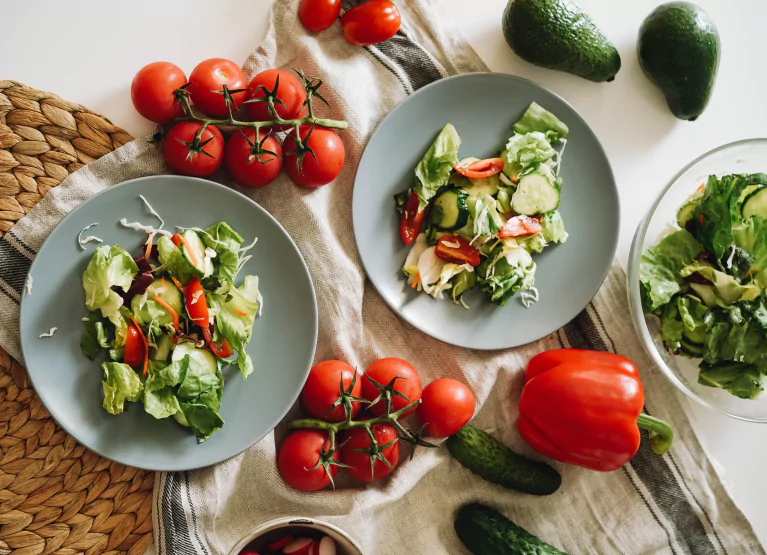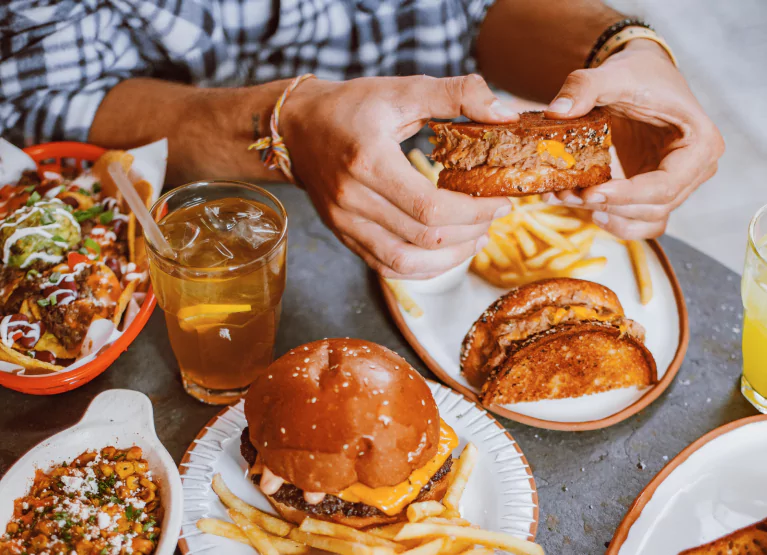7 of the Worst Foods For Acid Reflux

Key Takeaways
You may be familiar with heartburn, which is the burning feeling in your chest caused by acid reflux. Heartburn is an unpleasant sensation that occurs when stomach acid rises back up into your esophagus and can be caused from things like excess stress, dietary choices, or even sleep deprivation.
While there are many factors that can contribute to symptoms of acid reflux and heartburn, certain dietary choices can potentially make your symptoms worse.
In this article, we’ll break down what causes acid reflux and heartburn, what lifestyle changes may help, and which foods you may want to avoid if you’re experiencing these symptoms.
What is Acid Reflux?

When you swallow food, your esophagus carries it from your mouth to your stomach. A muscle at the bottom of the esophagus called the lower esophageal sphincter (LES) relaxes to let the food into the stomach and then tightens again. If the LES isn’t working properly, stomach acid and other stomach contents can flow back into the esophagus.
Acid reflux causes heartburn, which is the burning feeling in the chest caused by the stomach acid entering your esophagus. Chronic cases of acid reflux are known as gastroesophageal reflux disease, or GERD.
Acid reflux symptoms may include:
- Upper abdominal or chest pain
- Trouble swallowing
- Feeling like you have a lump in your throat
- Indigestion
- Burning sensation in the chest that worsens when lying down or bending over
- A bitter or acidic taste in the mouth
How Your Diet Affects Acid Reflux

Because acid reflux affects the gastrointestinal tract, your diet can have a big impact on your symptoms. Certain foods may be more prone to cause acid reflux because of their acid content, or because of their effect on the LES muscles that keep acid from back up into the esophagus.
However, just like certain foods can cause acid reflux, other types of foods may have a positive effect on acid reflux. For example, one 2018 study found that a diet high in fiber may increase LES pressure, which may reduce heartburn symptoms.
A low-fiber diet has been associated with decreased gastrointestinal motility, meaning that it may weaken the gastrointestinal muscles that prevent heartburn. Another 2017 study of almost 4,000 Iranian adults found that a diet high in fruit and vegetables may help manage or prevent the symptoms of GERD.
Other Factors that Can Affect Heartburn
There are a number of dietary and lifestyle changes that may be beneficial for symptoms of acid reflux. For example, according to research, avoiding big meals less than three or four hours before bed and maintaining a good posture while eating has also been shown to alleviate heartburn symptoms.
Other studies suggest that heartburn can worsen while lying down, though it may depend on your position. Some research also suggests that chewing gum may be helpful for heartburn. This is thought to be helpful because gum chewing may increase swallowing frequency, which might improve the clearance of reflux within the esophagus.
Studies to date have found that altering meal size, timing of meals, and overall macronutrient composition may be more effective than elimination diets alone. This includes reduction of meal size, decreasing carbohydrate content (especially simple sugars), and shifting away from late-night eating patterns.
7 of the Worst Foods to Eat If You Experience Acid Reflux
There are many foods and beverages associated with heartburn symptoms. However, not all foods will affect everyone the same way. Something that can trigger heartburn for one person may not have any effect on someone else.
It’s also important to remember that when you eat can have as much of an impact as what you eat. Because acid reflux tends to get worse at night, a certain food that may cause heartburn when eaten in the evening might not have the same effect during the day.
So what are some of the worst foods for acid reflux? Let’s break them down here:
1) Fried and Fatty Foods

High fat and fried foods have been associated with heartburn. In a 2021 study on the effect of diet on 85 people with GERD symptoms, 52 percent of the participants reported that fried foods triggered their heartburn.
It’s unclear exactly why fatty foods may cause heartburn symptoms. Some experts believe it might be because the digestion of fat from foods like avocado, olive oil, and other sources requires your stomach to secrete bile salts and the hormone cholecystokinin. Fat also decreases gastric emptying and may delay the stomach emptying its contents.
This may have an effect on the LES and irritate the esophagus. At the same time, researchers have found low-fat foods and full-fat dairy products do not appear to lead to worsened symptoms in individuals with GERD.
If you struggle with heartburn, you may want to consult a registered dietitian and test different foods to see what works best for you. If fried or high-fat foods such as french fries give you heartburn symptoms, you may want to consider limiting them to help prevent or reduce these feelings.
2) Spicy Foods
Spicy foods can cause heartburn, though researchers are still investigating the potential link to determine why this is. A 2020 study found that capsaicin, found in red chilis, led to increased gastric accommodation, which relaxes the stomach.
This may in turn lead to LES relaxation, which allows acid from the stomach to back up into the esophagus. You may consider limiting spicy foods if you experience heartburn after eating them.
3) Citrus Fruit

Citrus fruits may cause heartburn symptoms because of their high acid content. If you have acid reflux or GERD, you may want to take caution when eating fruits such as oranges, lemons, limes, grapefruit, and other citrus fruits and juices.
Consult a dietitian if you aren’t sure whether limiting citrus in your diet is the right choice for you and your health.
4) Caffeine
Caffeine has been associated with decreased LES tension, which may allow acid from the stomach back into the esophagus. This appears to be particularly true when it comes to coffee.
According to one study, even decaf coffee is associated with an increase in stomach acid and LES relaxation. Consider limiting caffeinated beverages like coffee, tea, and soda if you experience heartburn.
5) Peppermint

Peppermint is another food that has been linked to heartburn. This may be because it relaxes the LES and other muscles of the gastrointestinal tract, which can allow acid to back up into the esophagus.
If you experience heartburn after eating or drinking peppermint, you may want to limit sources of peppermint such as gums, herbal tea, and fresh mint in your diet.
6) Chocolate
Like many other foods on this list, chocolate may relax the muscles in the LES, causing heartburn. In a 2021 study of 85 people with GERD symptoms, 55 percent of the participants reported that chocolate triggered their heartburn.
As we mentioned, different foods may affect each individual differently. You may want to consult a medical professional if removing certain foods from your diet does not alleviate your heartburn symptoms.
7) Alcohol

Alcohol has also been linked to the relaxation of the LES muscles. A 2019 review of scientific studies found that that consumption of alcohol may also be a risk factor for developing GERD.
If you are concerned about your acid reflux or prone to chronic symptoms of this condition, you may want to limit or avoid alcohol and consult a dietitian for further advice.
Best Foods for Acid Reflux

Now that we’ve outlined some of the biggest potential triggers of heartburn and acid reflux, let’s review a few types of foods that you may want to prioritize in your diet.
Consuming adequate amounts of fiber may reduce the risk of heartburn. Fiber can have a number of health benefits for almost anyone, and has been linked to improved glycemic control and a reduced risk for cardiovascular disease.
If you are not used to consuming high amounts of fiber, be sure to consult a dietitian and slowly incorporate more of these foods into your diet to avoid side effects such as bloating or digestive system distress.
Both root veggies and leafy green vegetables may be helpful to consume regularly if you struggle with acid reflux. Whole grains such as oats, brown rice and vegetables such as sweet potatoes and carrots are all good sources of fiber. You can find some other nutritious sources of fiber in this article.
Adding fiber to your diet can also help you feel more satiated and prevent overeating, which is another factor that may worsen heartburn symptoms.
Find the right Nutrisense programto turn insight into progress.
Go Beyond Glucose Data with Nutrisense
Your glucose can significantly impact how your body feels and functions. That’s why stable levels are an important factor in supporting overall wellbeing. But viewing glucose isn't enough. Nutrisense, you’ll be able to learn how to use your body's data to make informed lifestyle choices that support healthy living.
One-to-one coaching
Sign up to access insurance-covered video calls to work with a glucose expert: a personal registered dietitian or certified nutritionist who will help tailor your lifestyle and diet to your goals.
Monitor and measure what matters
With the Nutrisense CGM Program, you can monitor your glucose with health tech like glucose biosensors and continuous glucose monitor (CGM)s, and analyze the trends over time with the Nutrisense App. This will help you make the most informed choices about the foods you consume and their impact on your health.
Find your best fit
Ready to take the first step? Start with our quiz to find the right Nutrisense program to help you take control.

Heather is a Registered and Licensed Dietitian Nutritionist (RDN, LDN), subject matter expert, and technical writer, with a master's degree in nutrition science from Bastyr University. She has a specialty in neuroendocrinology and has been working in the field of nutrition—including nutrition research, education, medical writing, and clinical integrative and functional nutrition—for over 15 years.




